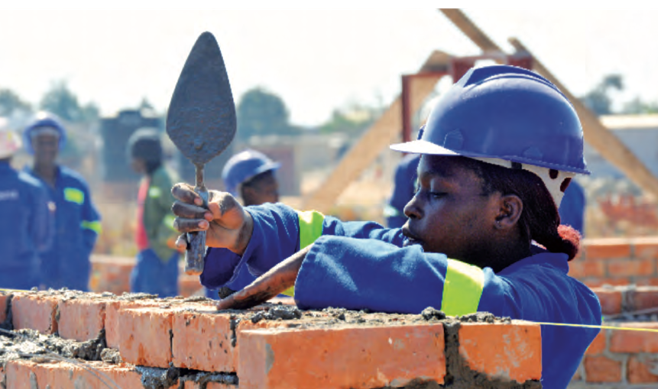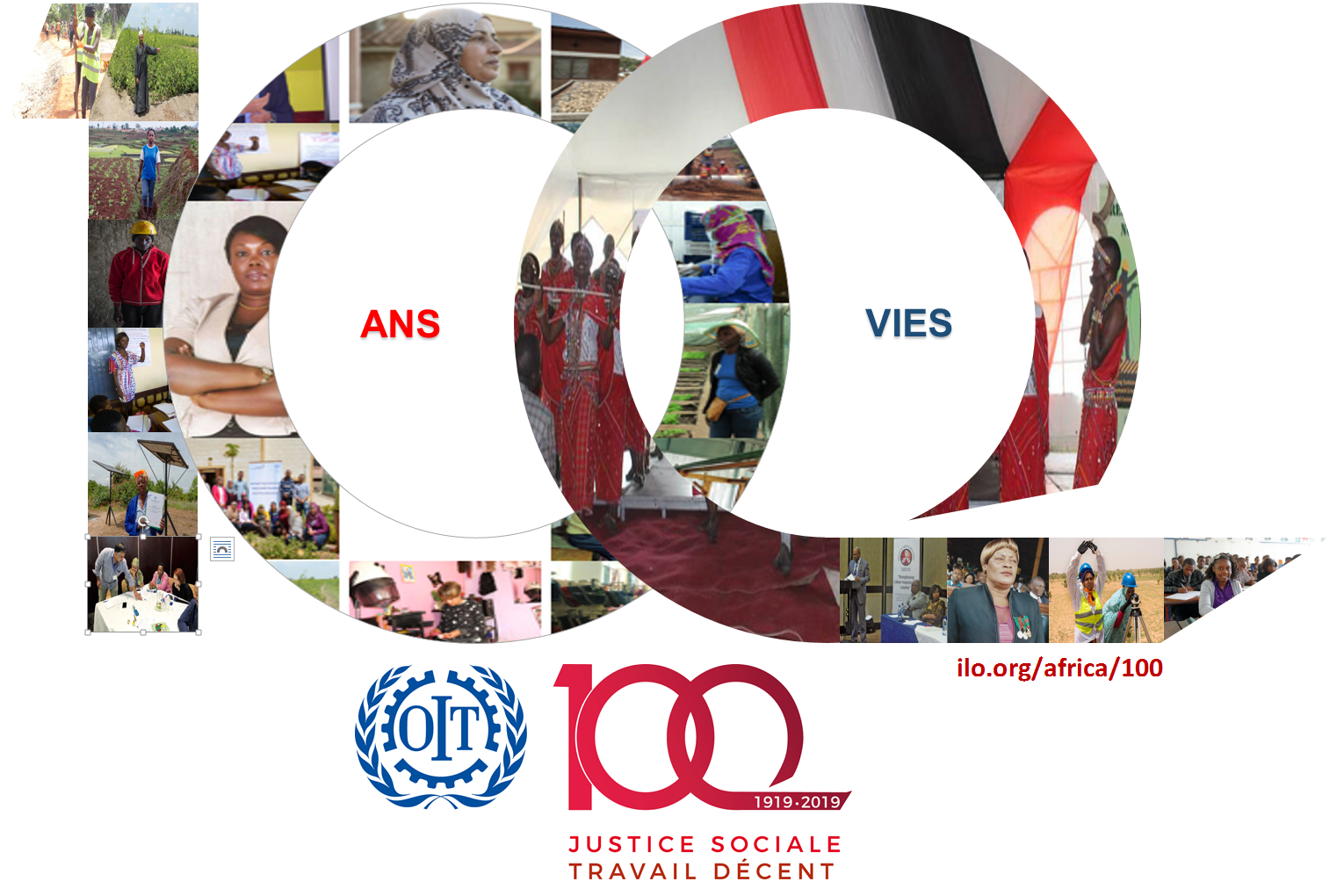« 100 Years – 100 Lives » | ZIMBABWE - “I cannot wait to start working in my community and prove what I am capable of”
An ILO-led public-private partnership in a poor neighbourhood on the outskirts of Harare demonstrated how investments in clinics, schools and roads can be a means to provide skills and employment opportunities for young people.

HARARE - Zimbabwe has faced economic challenges over the last two decades that have diminished both central and local Government’s capacities to extend or maintain public infrastructure.
The public housing system is also under pressure. This situation has forced some citizens to build houses outside properly zoned and un-serviced areas, without meeting construction standards.
One such community is Hopley, a peri-urban district located on the outskirts of Harare with a population of about 200,000 people, of whom one third is aged 10–24 years.
Hopley is characterized by high levels of migration, poor infrastructure, weak social services, low education, high unemployment and informal work. Young people have limited access to formal jobs and rely on the informal economy, which leaves them without decent work and in a state of working poverty. Child marriages and teenage pregnancies are common, at 18 per cent and 21 per cent respectively of the population; 70 per cent of women are mothers by age 24.
Targeting vulnerable youth
In this context, the ILO teamed up with the City of Harare, private partners and UNFPA, another UN agency, to design a skills-for-youth employment and infrastructure development project in Hopley.
The aim was also to improve access to sexual and reproductive health services by young people in the area, as part of the UN Joint Program on Adolescent and Youth Development.
The ultimate goal of the programme was to support young people in leading healthy and productive lives; to reduce unwanted pregnancies, early marriages, HIV incidence and school dropouts; and to create employment opportunities.
In Hopley, vulnerable young people, particularly young women, were enrolled in a skills training programme at the St Peters Kubatana Vocational training centre. 50 young people were trained in brick laying, carpentry, plumbing and electrical works, and are now contributing to the construction of a polyclinic and a multi-purpose youth centre. 50 others received training in cobblestone technology – a low cost employment- intensive approach to road building.
A demonstration road was constructed for feasibility assessment and possible roll-out by the City of Harare.
At the end of a six-week residential training period, the young people were placed under the guidance of experienced professionals and contributed to the construction of a 1,200 m2 clinic and a 600 m2 multi-purpose youth facility.
In addition to learning technical skills, the young people were inducted into a culture of business and networks, which will serve them well in finding jobs or getting into self-employment.
Promoting gender equality
Another key element of the initiative was to promote gender equality, as 56 per cent of trainees in traditionally male dominated areas of work were female.
Kudakwashe Josaka, 22 years, is one of the beneficiaries who joined the project as an apprentice in brick- laying.
“When I failed to complete my Ordinary Levels, I thought that was the end of the road for me,” she remembered.
However, when she heard about the project, she enlisted for the programme and proved herself in her trade.
“I cannot wait to start working in my community and prove what I am capable of,” she added.
24-year-old Aubrey Kwenda, learned brick-laying and thereafter joined hands with three of his peers to start a construction company. Their business has already won a number of contracts to build homes in their community.
“We realized that as individuals it would be difficult to convince a client to give us work, but as a group it is possible and we can finish the work quickly,” he said.
With the revenue from his work Aubrey has been able to realize his dream of moving out of his parents’ home into a place of his own.
All in all, the programme created a total of 4,200 workdays for the community. These work opportunities benefited about 120 young apprentices, 60 artisans and 190 casual workers.
By the time the project was completed in April 2018, a total of USD 220,000 had been transferred as wages to workers from the community and income for small businesses around the work site.
The public housing system is also under pressure. This situation has forced some citizens to build houses outside properly zoned and un-serviced areas, without meeting construction standards.
One such community is Hopley, a peri-urban district located on the outskirts of Harare with a population of about 200,000 people, of whom one third is aged 10–24 years.
Hopley is characterized by high levels of migration, poor infrastructure, weak social services, low education, high unemployment and informal work. Young people have limited access to formal jobs and rely on the informal economy, which leaves them without decent work and in a state of working poverty. Child marriages and teenage pregnancies are common, at 18 per cent and 21 per cent respectively of the population; 70 per cent of women are mothers by age 24.
Targeting vulnerable youth
In this context, the ILO teamed up with the City of Harare, private partners and UNFPA, another UN agency, to design a skills-for-youth employment and infrastructure development project in Hopley.
The aim was also to improve access to sexual and reproductive health services by young people in the area, as part of the UN Joint Program on Adolescent and Youth Development.
The ultimate goal of the programme was to support young people in leading healthy and productive lives; to reduce unwanted pregnancies, early marriages, HIV incidence and school dropouts; and to create employment opportunities.
In Hopley, vulnerable young people, particularly young women, were enrolled in a skills training programme at the St Peters Kubatana Vocational training centre. 50 young people were trained in brick laying, carpentry, plumbing and electrical works, and are now contributing to the construction of a polyclinic and a multi-purpose youth centre. 50 others received training in cobblestone technology – a low cost employment- intensive approach to road building.
A demonstration road was constructed for feasibility assessment and possible roll-out by the City of Harare.
At the end of a six-week residential training period, the young people were placed under the guidance of experienced professionals and contributed to the construction of a 1,200 m2 clinic and a 600 m2 multi-purpose youth facility.
In addition to learning technical skills, the young people were inducted into a culture of business and networks, which will serve them well in finding jobs or getting into self-employment.
Promoting gender equality
Another key element of the initiative was to promote gender equality, as 56 per cent of trainees in traditionally male dominated areas of work were female.
Kudakwashe Josaka, 22 years, is one of the beneficiaries who joined the project as an apprentice in brick- laying.
“When I failed to complete my Ordinary Levels, I thought that was the end of the road for me,” she remembered.
However, when she heard about the project, she enlisted for the programme and proved herself in her trade.
“I cannot wait to start working in my community and prove what I am capable of,” she added.
24-year-old Aubrey Kwenda, learned brick-laying and thereafter joined hands with three of his peers to start a construction company. Their business has already won a number of contracts to build homes in their community.
“We realized that as individuals it would be difficult to convince a client to give us work, but as a group it is possible and we can finish the work quickly,” he said.
With the revenue from his work Aubrey has been able to realize his dream of moving out of his parents’ home into a place of his own.
All in all, the programme created a total of 4,200 workdays for the community. These work opportunities benefited about 120 young apprentices, 60 artisans and 190 casual workers.
By the time the project was completed in April 2018, a total of USD 220,000 had been transferred as wages to workers from the community and income for small businesses around the work site.





